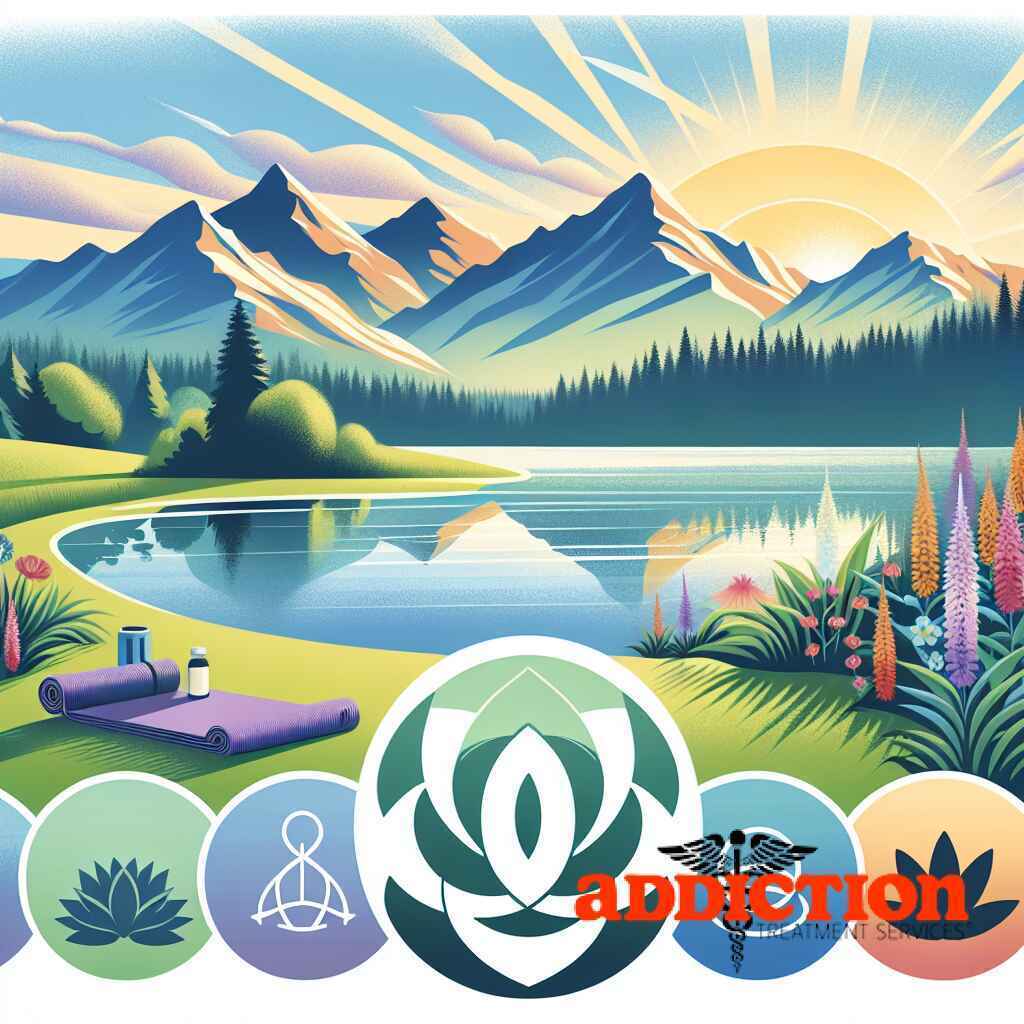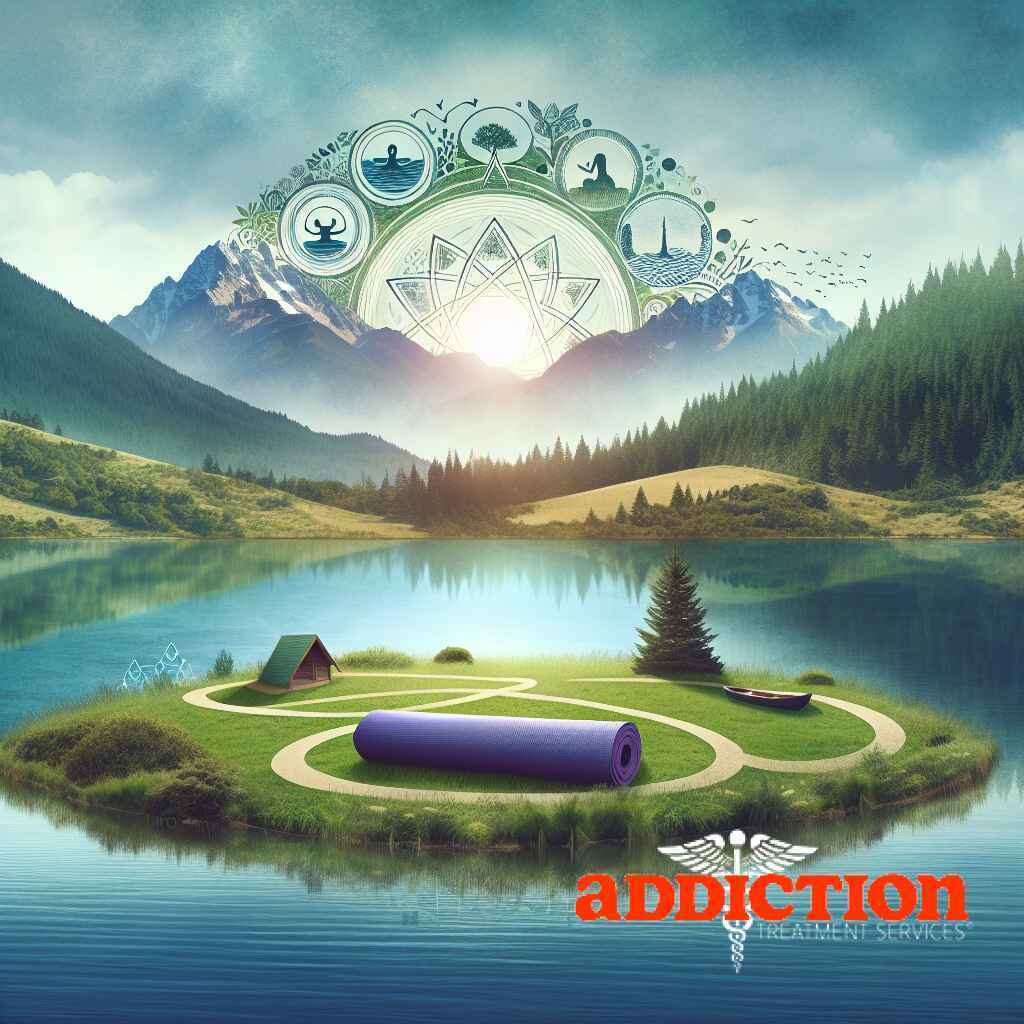 Posted On: 05/21/2024
Posted On: 05/21/2024Embracing Holistic Healing in Washington
Understanding Holistic Recovery
Holistic recovery goes beyond merely addressing the physical aspects of addiction, it encompasses the healing of the mind, body, and spirit. This approach to recovery treats the individual as a whole, recognizing that addiction is a complex condition influenced by various factors, including emotional pain, mental health issues, and physical health. Holistic recovery services in Washington provide a range of therapies designed to support individuals not just in overcoming their addiction but in finding a new, balanced, and fulfilling way of life. Techniques such as yoga, meditation, nutritional therapy, and more, are integrated alongside more conventional treatment methods to encourage comprehensive healing.
The Importance of a Comprehensive Approach
A comprehensive approach to addiction recovery is vital because substance use disorders are multifaceted illnesses that can affect every aspect of a person’s life. This method considers every angle, from the immediate needs of detoxification and dealing with withdrawal symptoms to long-term strategies for relapse prevention and personal development. It involves a combination of medical treatment, counseling, lifestyle changes, and supportive recovery communities. Addiction treatment services that adopt a comprehensive approach recognize that effectively addressing substance abuse requires more than just stopping the substance use, it requires rebuilding and nurturing all areas of an individual’s life.
Why Washington Is Ideal for Holistic Addiction Treatment
Washington State offers an ideal background for holistic addiction treatment for several reasons. Firstly, its natural beauty and outdoor activities provide ample opportunities for healing and rejuvenation through connection with nature. From the lush landscapes of the Olympic Peninsula to the serene waters of Puget Sound, individuals in recovery can find peace and space for reflection. Additionally, Washington is home to a diverse array of holistic recovery services, from detox centers that use nontraditional methods to comprehensive rehab programs that include a variety of alternative therapies. Lastly, the state has a strong and supportive recovery community, offering everything from specialized holistic treatment centers to regular group meetings focused on meditation, yoga, and other healing practices. These resources make Washington a prime location for anyone seeking a holistic path to recovery from addiction.
Identifying Your Path to Recovery
Evaluating Holistic and Traditional Treatment Options
When considering treatment for addiction, it’s essential to weigh both holistic and traditional options. Holistic treatments focus on healing the entire individual-mind, body, and spirit-through techniques such as meditation, yoga, and nutritional therapy. Traditional treatments, on the other hand, often revolve around medication-assisted treatment, behavioral therapies, and support groups. Comprehensive rehab programs in Washington State blend these approaches, providing a tailored recovery journey that addresses the unique needs of each individual. By integrating comprehensive rehab programs in Washington State, those in recovery can benefit from a multi-faceted approach that fosters long-term success.
Washington Addiction Counseling and Support
Substance misuse counseling is a cornerstone of addiction recovery, offering guidance, support, and strategies for dealing with substance abuse. In Washington, addiction treatment services include counseling by trained professionals who understand the complexities of addiction. This personal support is coupled with group therapy sessions, where individuals can share experiences and learn from each other in a supportive environment. The state is home to a myriad of resources, including substance misuse counseling in Washington, ensuring that anyone seeking help can find the support they need to navigate their recovery journey.
Creating a Personalized Recovery Plan
A personalized recovery plan is a roadmap that outlines the steps an individual will take on their path to recovery. It considers personal history, substance use patterns, and life circumstances, integrating both holistic and traditional treatment options that align with the individual’s values and needs. Developing such a plan requires thoughtful consideration and often the guidance of addiction recovery professionals. By leveraging resources like Addiction Treatment Services, individuals can explore a wide array of treatment options available throughout Washington. This ensures the creation of a recovery plan that not only addresses the physical aspects of addiction but also fosters emotional, mental, and spiritual growth.
Integrating Natural Detox Methods
Benefits of Natural Detoxification
Natural detoxification strategies, which often include the use of herbal supplements, hydration, exercise, and sauna therapy, can offer a gentler approach compared to traditional medical detox methods. These practices aim to cleanse the body of toxins accumulated through substance use in a way that tends to be less harsh on the system. Adopting holistic detoxification strategies can also empower individuals by involving them actively in their recovery process, providing a sense of control and participation that’s crucial for healing. Furthermore, natural detox methods often come with fewer side effects, making the detox experience more comfortable and potentially encouraging a more positive outlook towards the journey ahead.
Washington Detox Services Emphasizing Holistic Methods
In Washington, the focus on embracing holistic methods for detoxification is evident in the variety of programs that incorporate nontraditional detox methods. These services understand the value of addressing not just the physical withdrawal symptoms but also the mental and spiritual aspects of recovery from substance misuse. For instance, offering therapies such as acupuncture, meditation, and even certain forms of physical activity that can complement the detox process. This emphasis on nontraditional detox methods supports a more comprehensive healing experience, ensuring that recovery starts on a solid foundation of physical and mental well-being.
Nutritional Therapy in Recovery
Nutritional therapy plays a pivotal role in recovery, especially during the detox phase. It’s well-acknowledged that substance use disorders can lead to significant nutritional deficiencies, affecting overall health and the body’s ability to heal. Integrating nutritional therapy for addiction recovery involves customized diet plans that provide essential nutrients, vitamins, and minerals to support the body’s recovery and repair processes. Encouraging a balanced diet rich in fruits, vegetables, whole grains, and lean proteins can enhance energy levels, improve mood, and strengthen the immune system. Nutritional therapy in recovery not only addresses physical health but also supports cognitive functions, reducing cravings and facilitating a smoother recovery journey. By prioritizing nutrition, individuals in recovery can significantly improve their chances of long-term success and overall well-being.
Leveraging Mindfulness and Meditation
The Role of Mindfulness in Addiction Recovery
Mindfulness is an essential tool in the holistic recovery process, serving as the foundation for a more conscientious and self-aware journey toward sobriety. By fostering a present-centered awareness and acceptance of one’s thoughts, feelings, and bodily sensations without judgment, mindfulness helps individuals navigate the challenges of addiction recovery with greater ease and resilience. In Washington, where the natural surroundings offer a serene backdrop for introspection and healing, mindfulness practices become even more potent. Whether it’s through individual meditation sessions, guided mindfulness groups, or incorporating mindfulness into daily activities, this approach can significantly reduce stress, anxiety, and cravings, all common hurdles in the early stages of recovery. By embracing mindfulness, individuals can find a path to sobriety that is not only sustainable but also enriching, allowing for a full engagement with the present moment and a deeper understanding of oneself.
Addiction Meditation Practices Washington
In Washington, addiction recovery programs integrate meditation practices as a core component of holistic healing. Meditation offers a unique set of benefits, including increased mental clarity, stress reduction, and an enhanced ability to cope with the ups and downs of recovery. Washington is home to numerous addiction meditation practices, from guided sessions tailored to individuals in recovery to rehabs that incorporate meditation as part of a broader therapeutic regimen. These practices are designed to complement traditional addiction treatments, providing a spiritual and mental anchor that supports the journey towards sobriety. With the stunning natural environment of Washington, individuals have the perfect setting to engage in outdoor meditation, whether it’s beside the tranquil waters of the Puget Sound or amidst the serene beauty of the Cascade Range, enhancing the meditation experience and fostering a deeper connection to the natural world.
Improving Mental and Emotional Health Through Mindfulness
The significance of mental and emotional health in the journey of addiction recovery cannot be overstated. Mindfulness plays a crucial role in improving these aspects by teaching individuals how to manage thoughts and emotions in a healthy and constructive way. By learning to observe their inner experiences without attachment or judgment, those in recovery can better understand the root causes of their addiction and develop healthier coping mechanisms. Regular mindfulness practice leads to enhanced emotional regulation, reduced instances of depression and anxiety, and a greater sense of inner peace. Importantly, mindfulness encourages a compassionate relationship with oneself, an aspect that is often neglected in the throes of addiction. As individuals learn to replace self-criticism with self-compassion, they build a more supportive internal environment conducive to long-term recovery. In Washington, mindfulness and meditation are not just practices but vital pathways to rebuilding one’s life free from addiction, surrounded by a community that values holistic health and wellness.
Alternative Therapies in Addiction Treatment
Exploring Alternative Addiction Treatments Washington
In the journey toward recovery, it’s crucial to recognize that one size does not fit all. This is particularly true in Washington, where the landscape of alternative addiction treatments is as diverse as its natural scenery. From the bustling streets of Seattle to the quiet, forested corners of the Olympic Peninsula, the state offers a myriad of non-traditional therapies that cater to the holistic healing of individuals grappling with addiction. These treatments range from adventure therapy, leveraging Washington’s vast outdoor landscapes, to art and music therapies that tap into the creative energies of the individual. The aim is to provide healing modalities that resonate on a personal level, fostering deeper, more meaningful recovery pathways.
Alternative therapies understand and address the multifaceted nature of addiction, offering approaches that are often more appealing to those who might not find conventional methods suitable. By integrating practices such as equine therapy, where the bond between human and animal can be therapeutic, or biofeedback, which uses electronic monitoring to teach control over bodily processes, these treatments in Washington offer innovative options outside the bounds of traditional addiction recovery methods.
The Effectiveness of Holistic Therapy for Addiction
The effectiveness of holistic therapy for addiction lies in its capacity to treat the entire person-body, mind, and spirit-rather than focusing solely on the addiction itself. Holistic therapies aim to bring about healing by identifying and addressing the underlying causes of addiction, such as trauma, stress, and co-occurring mental health disorders. Practices like mindfulness meditation and yoga help individuals develop self-awareness and emotional regulation skills, critical components in managing cravings and avoiding relapse.
Holistic therapy also emphasizes the importance of a balanced lifestyle, which includes proper nutrition, physical activity, and healthy social interactions. These elements are vital in promoting mental health and physical well-being, further enhancing an individual’s resilience against the triggers of addiction. By incorporating holistic therapy into the recovery process, individuals gain access to a broad spectrum of tools and skills that empower them to lead a sober, fulfilling life. This comprehensive approach ensures that the recovery is not only about abstaining from substances but also about building a life that supports sustained sobriety and health.
Incorporating Yoga and Acupuncture in Recovery
Yoga and acupuncture are prime examples of how ancient practices are being employed with remarkable results in modern addiction recovery settings, including those in Washington. Yoga provides a dual benefit for individuals in recovery by offering physical exercise, which improves health and releases endorphins, alongside meditation, which reduces stress and promotes mental clarity. The practice teaches breathing techniques and poses that enhance mindfulness and present-moment awareness, essential skills for managing the emotional and psychological challenges of recovery.
Acupuncture, on the other hand, is a technique of traditional Chinese medicine that has been used to treat various ailments for thousands of years. In the context of addiction recovery, acupuncture is used to alleviate withdrawal symptoms, reduce cravings, and induce a state of relaxation. It works on the principle of stimulating specific points on the body to balance energy flows and improve overall well-being. Programs throughout Washington have begun to recognize the value of such treatments and are incorporating them into more traditional recovery models to provide a more comprehensive, supportive approach to addiction treatment. Together, yoga and acupuncture represent vital components of a holistic strategy, addressing the needs of the body and mind in unison and offering a powerful pathway towards healing and recovery.
Building a Supportive Recovery Community
The Power of the Washington Recovery Community
In the tapestry of addiction recovery, the community plays a pivotal role, serving as both a support network and a mirror reflecting the potential for change and growth. In Washington, the recovery community is particularly vibrant and diverse, offering a wealth of resources and group dynamics that cater to various stages and styles of recovery. This community is characterized by its inclusiveness, understanding, and mutual respect, qualities that are indispensable for those navigating the path to sobriety.
Participants in the Washington recovery community typically engage in regular meetings, workshops, and social gatherings designed to foster a sense of belonging and shared purpose. These platforms not only provide emotional support but also impart valuable life skills and coping strategies, significantly reducing feelings of isolation and despair often associated with addiction. The connective tissue of this community is its collective wisdom and experiences, offering insights and practical advice that can propel individuals towards sustained recovery and personal growth.
Sober Living Washington: An Avenue for Peer Support
Sober living environments in Washington provide more than just a drug-free space, they are instruments of transformation and healing. The concept of healthy living in sober houses is built on the foundation of communal living and peer support, elements that are crucial for individuals in the delicate phases of early recovery. These residences operate on principles of self-governance, accountability, and mutual aid, creating a microcosm of the larger recovery community where residents learn to navigate sobriety in a supportive, structured environment.
Living in a sober house often means participating in daily meetings, engaging in communal chores, and adhering to a set of rules designed to maintain the integrity and purpose of the home. This experience teaches valuable lessons in responsibility, discipline, and interpersonal communication, setting the groundwork for a sober, productive lifestyle. Additionally, the friendships and bonds formed within these houses can last a lifetime, providing an enduring network of support that extends far beyond the walls of the residence.
Family and Community Involvement in the Recovery Process
Family and community involvement are key components in the holistic recovery process, offering a multi-faceted support system that enhances the effectiveness of individual efforts. Engaging families in therapy sessions, educational programs, and community activities helps bridge gaps in understanding and communication, fostering healthy relationships and a more conducive environment for recovery.
The role of the community in this collective effort is twofold. First, it provides a broader social network of support and understanding, breaking the stigma associated with addiction and facilitating reintegration into society. Second, community involvement introduces opportunities for service and contribution, avenues through which individuals in recovery can find purpose and fulfillment beyond their personal sobriety goals. Programs that encourage mentorship, volunteer work, and active participation in recovery advocacy work not only benefit the wider community but also reinforce the individual’s commitment to sobriety and personal growth. Through these communal and familial efforts, the journey of recovery becomes a shared venture, imbued with a deeper sense of meaning and connection.
Strategies for Long-term Recovery and Relapse Prevention
Holistic Strategies for Sustaining Sobriety
Holistic strategies for sustaining sobriety emphasize a balanced lifestyle that nurtures physical, emotional, and spiritual well-being. These techniques can significantly enhance conventional treatment plans, addressing the root causes of addiction and supporting a more profound healing process. Engaging in regular physical activity, such as yoga or nature walks, not only improves physical health but also reduces stress and anxiety, key triggers for relapse. Likewise, adopting a balanced diet rich in nutrients supports both the body and brain, aiding in recovery and reducing cravings.
Beyond the physical aspects, holistic recovery also involves mindful practices like meditation and journaling that foster mental clarity and emotional stability. Incorporating holistic interventions for addiction into a recovery plan encourages self-discovery and growth, helping individuals rebuild their lives on a foundation of personal integrity and resilience. Achieving sobriety is not just about removing substances from one’s life, it’s about creating a life where substances no longer offer the appeal they once did because one’s needs are met through healthier means.
Relapse Prevention: A Holistic Perspective
Relapse prevention from a holistic standpoint underscores the importance of acknowledging and addressing the multifaceted nature of addiction. It integrates strategies that enhance an individual’s ability to cope with life’s stresses and emotional triggers without turning to substances. Key to this approach is building a strong support system, including family, friends, and recovery groups, providing a network of encouragement and understanding crucial for maintaining sobriety.
Additionally, effective relapse prevention involves ongoing monitoring and management of mental health. Addressing mental health in substance abuse recovery is essential, as co-occurring disorders such as depression or anxiety can significantly increase the risk of relapse. Regular psychotherapy for addiction treatment, combined with active participation in support groups, creates a robust framework for individuals to express themselves, confront challenges, and cultivate coping mechanisms that do not involve substance use.
Engaging in continuous personal development and growth is pivotal for long-term recovery and relapse prevention. It involves a commitment to exploring new interests, learning new skills, and setting and achieving goals that contribute to a sense of purpose and fulfillment. This continuous growth process encourages individuals to see beyond the immediate challenges of recovery, envisioning a fulfilling future that is well within their reach. Programs that focus on recovery for substance misuse in Washington often incorporate these elements, offering a holistic blueprint for achieving and sustaining sobriety.
Engaging in Continuous Personal Development and Growth
Continuous personal development and growth are essential for ensuring that recovery is not just a phase but a lifelong journey. This could involve pursuing educational goals, engaging in community service, or exploring spiritual practices that resonate with personal beliefs and values. Such activities not only provide meaningful occupation but also strengthen the individual’s identity beyond their struggle with addiction.
Personal development in the realm of addiction recovery is about harnessing one’s strengths and applying them toward achieving long-term goals and overcoming setbacks. As individuals acquire new knowledge and skills, their confidence grows, reducing the likelihood of relapse by reinforcing their value and capabilities. Continuous growth creates a dynamic recovery process, where individuals are constantly adapting and finding new ways to cope with life’s challenges without reverting to old patterns of substance misuse. Recovery programs for substance misuse in Washington emphasize this aspect, encouraging those in recovery to immerse themselves in activities that promote self-improvement and community engagement, ultimately fostering a lifestyle that supports sustained recovery.
Holistic Wellness and Physical Health
The Connection Between Physical Health and Recovery
The journey towards sobriety is as much about rejuvenating the body as it is about clearing the mind and spirit from the ties of addiction. The intertwined relationship between physical health and recovery from substance misuse underpins the philosophy of holistic healing. A person’s overall well-being is significantly impacted by their physical health, which in turn affects their capability to cope with stress, resist cravings, and maintain a positive outlook on life during recovery. Effective addiction recovery services, like those offered in Washington State, emphasize the importance of rebuilding physical health as a foundational step towards sustainable sobriety. This approach acknowledges that healing the body is integral to healing the whole person, creating a resilient base upon which individuals can build their new, sober lives.
Exercise and Holistic Health for Substance Misuse
Exercise plays a pivotal role in holistic health strategies for individuals overcoming substance misuse. Regular physical activity fosters not only physical strength and endurance but also promotes mental health benefits such as reduced anxiety, enhanced mood, and improved sleep patterns. In Washington, there are a wealth of opportunities to integrate exercise into recovery programs, ranging from outdoor adventures in its breathtaking landscapes to structured fitness classes designed specifically for those in recovery. Engaging in physical activity becomes a powerful tool in the recovery arsenal, offering a natural and healthy outlet for stress and an effective distraction from cravings. By incorporating routine exercise, individuals navigating the path of recovery in Washington can enhance their physical health, which is crucial in supporting the overall journey towards wellness and sobriety.
Nutritional Therapy in Recovery
Underpinning every effective recovery program is an emphasis on nutritional therapy to restore the body’s equilibrium that has been disrupted by substance abuse. Substance misuse often leads to malnutrition or unhealthy eating habits, which can exacerbate withdrawal symptoms and impact mental health. In Washington, nutrition therapy forms an integral part of holistic recovery programs, designed to replenish the body’s depleted nutrients, support brain health, and boost the immune system. Customized nutritional plans focus on incorporating whole foods, rich in vitamins, minerals, and antioxidants, to fuel recovery and enhance physical and mental well-being. By prioritizing nutritional therapy, individuals are better equipped to handle the physical demands of detoxification and recovery, paving the way for a successful journey to sobriety. Recognizing the profound impact of diet on recovery outcomes, addiction treatment centers across Washington emphasize the role of balanced, nutritious meals as a cornerstone of holistic healing and enduring wellness.
Fostering Emotional and Spiritual Growth
The Role of Emotional Health in Recovery
The journey toward recovery from addiction is incomplete without addressing the emotional health of the individual. Emotional health shapes our views, impacts our decisions, and influences our habits, including those related to substance use. For individuals navigating the path of recovery, achieving emotional stability becomes as crucial as overcoming physical dependencies. This aspect of holistic healing encourages individuals to delve into underlying emotional triggers that may contribute to substance misuse, such as past traumas, unresolved conflicts, and daily stresses. Through therapies like Cognitive Behavioral Therapy (CBT) and Dialectical Behavior Therapy (DBT), offered across various Addiction Treatment Services in Washington, individuals gain access to powerful tools for managing emotions. These techniques help in identifying negative thought patterns, fostering emotional regulation, and cultivating healthier coping mechanisms.
Spiritual Practices and Their Place in Holistic Healing
Spirituality, often misunderstood as strictly religious practice, encompasses much more in the context of holistic recovery. It’s about finding a sense of purpose, connection, and inner peace, qualities that significantly boost the recovery process. Spiritual practices, therefore, are not limited to traditional religious rituals, they also include meditation, nature connection, mindfulness, and acts of kindness, which can profoundly influence an individual’s recovery journey. Such practices foster a deepened sense of self-awareness and a connection to a larger reality beyond personal struggles with addiction. By incorporating spiritual practices into the recovery plan, individuals often find a greater reservoir of strength to draw upon during challenging times. Washington offers numerous serene settings and communities where one can explore these spiritual practices, aiding in emotional healing and personal growth beyond the physical aspects of addiction recovery.
Developing Emotional Resilience in Recovery
Building emotional resilience is a cornerstone of effective addiction recovery. Emotional resilience refers to one’s ability to adapt to stress and adversity without resorting to substance use. Developing this resilience requires a multifaceted approach, incorporating elements such as maintaining a positive outlook, establishing a supportive social network, and practicing self-compassion. Recovery programs in Washington emphasize skills for building resilience through therapeutic workshops, support groups, and stress management techniques like yoga and meditation. Learning to navigate life’s ups and downs without reliance on substances not only strengthens emotional resilience but also empowers individuals to achieve long-term sobriety. Moreover, engaging in activities that foster personal growth and fulfillment contributes to a robust emotional foundation, fortifying the individual against potential relapses and enabling them to live a rich, substance-free life.
Navigating Challenges and Setbacks
Handling Stress and Anxiety without Substances
In the journey to holistic recovery in Washington, learning to handle stress and anxiety without turning to substances is vital. The beautiful, serene landscapes of Washington provide a natural remedy to life’s stresses, supporting practices such as mindfulness walks, outdoor meditation, and eco-therapy. Yet, integrating these activities into daily life requires commitment and the support of a strong recovery community. Techniques like deep breathing exercises, guided imagery, and mindfulness meditation have shown to be effective tools in managing stress and anxiety. Alongside these practices, Washington’s addiction treatment services emphasize building a toolkit of stress-relief strategies that residents can draw upon, helping to navigate the pressures of daily life without resorting to substance use. Tailored support from Washington’s top addiction recovery tools ensures individuals in recovery have access to a broad spectrum of resources aimed at managing stress and reinforcing their commitment to sobriety.
Managing Setbacks: Holistic Approaches
Encountering setbacks is a natural part of the recovery process, and adopting a holistic approach can significantly improve the resilience needed to overcome them. Washington provides a rich backdrop for engaging in therapeutic activities that foster physical and emotional healing, such as yoga, acupuncture, and nature immersion. These activities encourage self-reflection and growth, helping individuals understand and learn from setbacks rather than viewing them as failures. Holistic recovery programs in Washington also incorporate counseling and peer support groups, offering spaces where individuals can share their experiences and strategies for coping with challenges. The integration of holistic therapies ensures that recovery encompasses mental, physical, and emotional well-being, empowering individuals to handle setbacks with grace and determination.
The Importance of Flexibility in Recovery Goals
Flexibility in setting and adjusting recovery goals is a cornerstone of holistic healing. It acknowledges the dynamic nature of the recovery journey, where progress is non-linear and challenges are inevitable. Emphasizing adaptability, Washington’s recovery services encourage individuals to reassess and modify their goals as they grow and learn more about themselves and their needs. This approach prevents discouragement and helps maintain motivation, even when faced with obstacles. Flexibility also means being open to trying new recovery methods and tools, recognizing that what works for one individual may not work for another. The objective is to cultivate a personalized path to recovery that is both resilient and responsive to change, ensuring that each step forward is grounded in self-awareness and compassion. By embracing a flexible mindset, individuals in recovery can navigate the ups and downs of their journey with confidence and a greater chance of long-term success.
Choosing the Right Holistic Recovery Program in Washington
Key Factors to Consider When Choosing a Treatment Center
When selecting a holistic recovery program in Washington, it’s essential to consider several critical factors to ensure the chosen center aligns with your values, needs, and recovery goals. The program’s approach to treatment should integrate both traditional and holistic methods, offering a comprehensive path to wellness that addresses the mental, physical, and emotional aspects of recovery. Essential services might include detoxification support, counseling, alternative therapies such as yoga or acupuncture, and life skills training. Evaluating the qualifications of the staff, the center’s accreditation, and the types of aftercare support available can also guide your decision. Furthermore, considering the location’s atmosphere-whether it’s a serene countryside setting or a more urban environment-can significantly impact your recovery journey. Personal comfort plays a pivotal role in fostering a positive, healing experience.
Washington Addiction and Wellness Centers
Washington State is home to a broad spectrum of addiction and wellness centers, each offering unique programs and services aimed at holistic recovery. These residential treatment centers for holistic healing embody a foundation of care that transcends traditional addiction treatment, providing environments where individuals can explore various pathways to wellness. From meditation and mindfulness training to nutritional counseling and adventure therapy, these centers prioritize the development of a balanced lifestyle. They often feature beautiful, tranquil settings that leverage Washington’s natural beauty to support healing and reflection. Prospective residents should explore specific programs and therapies offered, staff expertise, and the center’s philosophy towards recovery to find a match that resonates with their personal journey towards wellness.
Ensuring a Program Aligns with Your Recovery Philosophy
Alignment with your recovery philosophy is paramount when choosing a holistic program. It’s crucial for the treatment center’s ethos-whether it focuses on spiritual growth, emphasizes the importance of community, or prioritizes self-empowerment-to resonate with your personal beliefs and values. Investigate the program’s core principles, the philosophies behind the therapies provided, and how treatment plans are customized to meet individual needs. Many individuals find that speaking directly with staff, touring the facility, and reading experiences from alumni can offer valuable insights into how well a program might support their unique pathway to recovery. Remember, the right program will feel like a partnership-one that respects and supports your individual journey to holistic wellness and sobriety.
Pathways to a Brighter Future: A Conclusion
Embracing Life beyond Addiction
Recovery from addiction is not merely about abstaining from substances, it’s about creating a life that one doesn’t want to escape from. This journey involves rediscovering or uncovering new hobbies, interests, and passions that fill life with joy, purpose, and fulfillment. Embracing life beyond addiction means building a new identity that isn’t tied to substance use, but rather to the richness and diversity of experiences and relationships that foster genuine happiness and contentment. For many in Washington, the scenic beauty, outdoor activities, and vibrant communities provide an idyllic setting for this transformation. Holistic recovery embraces this philosophy, offering a pathway that supports the exploration of personal interests, repairing and forging meaningful relationships, and ultimately, building a life filled with hope and possibilities.
Continued Learning and Growth Post-Recovery
Holistic recovery acknowledges that the journey doesn’t end with sobriety, it continues with lifelong learning and personal growth. Engaging in continued education, whether formal or informal, encourages individuals to keep growing and evolving. This can include learning new skills, pursuing further educational goals, or simply expanding knowledge on topics of interest. Psychoactive substance education, an important aspect of understanding substance use disorders, empowers individuals with the knowledge to make informed choices and helps foster a culture of prevention and awareness. Continued growth and learning ensure that recovery is an ongoing process of self-discovery and self-improvement, contributing to a sustainable and fulfilling sober life.
The Journey Ahead: Staying Committed to Holistic Wellness
Finally, the journey ahead in holistic wellness is an ongoing commitment to oneself and one’s well-being. It requires dedication to maintain the balance of mind, body, and spirit that supports sobriety and overall health. This may involve regular participation in wellness activities such as mindfulness meditation, yoga, community engagement, and continued therapy or counseling to address ongoing challenges and support mental health. Addressing mental health in substance abuse recovery is an essential component of holistic wellness, ensuring that individuals have the strategies and support to navigate life’s challenges without reverting to substance use https://en.wikipedia.org/wiki/Mental_health_professionals. Staying committed to holistic wellness means embracing self-care, seeking support when needed, and valuing oneself enough to prioritize health and sobriety. It’s a rewarding journey that leads to a life of authenticity, freedom, and profound well-being.
Embarking on this path in Washington, with its wealth of resources and supportive communities, offers a promising start and a bright future. It is a testament to the strength and resilience of the human spirit, and a reminder that recovery is not only about overcoming addiction but about embracing a life of holistic wellness and joy.
Frequently Asked Questions
Question: What holistic addiction treatment options does Addiction Treatment Services offer in Washington?
Answer: Addiction Treatment Services offers a comprehensive directory of holistic addiction treatment options throughout Washington, ensuring individuals have access to various therapeutic approaches. These include natural addiction treatment methods, mindfulness in addiction recovery, nutritional therapy in recovery, and alternative addiction treatments Washington-wide. Our curated list encompasses addiction treatment centers in Washington that specialize in holistic sobriety support, integrating therapies such as yoga, meditation, and acupuncture with traditional substance abuse treatment. By connecting individuals with a wide range of holistic healing substance abuse programs, we strive to support your unique path to recovery.
Question: How do mindfulness and meditation practices complement the addiction recovery process according to your services in Washington?
Answer: According to the range of Washington addiction recovery services listed on Addiction Treatment Services, mindfulness and meditation are key components in holistic recovery Washington programs. These practices foster a heightened awareness of the present moment, helping individuals understand and manage their cravings and triggers in a healthy manner. Addiction meditation practices Washington-based centers offer are designed to reduce stress, anxiety, and depression, all of which are common challenges during recovery. By promoting mental and emotional clarity, mindfulness, and meditation, aid individuals in building resilience and maintaining long-term sobriety.
Question: Can you provide details on the sober living Washington resources mentioned in the ‘Essential Tips for Holistic Recovery in Washington’ blog post?
Answer: In the ‘Essential Tips for Holistic Recovery in Washington’ post, we highlighted the importance of sober living environments as crucial for providing stability and support post-treatment. Addiction Treatment Services lists numerous sober living Washington options that offer a structured, drug-free environment. These residences emphasize peer support, accountability, and the practice of daily living skills, creating a conducive atmosphere for holistic wellness and recovery. Through our directory, we connect individuals with sober living homes that are committed to fostering a supportive community where residents can continue their journey to recovery and personal growth.
Question: How does the Washington recovery community support individuals in achieving holistic wellness and recovery?
Answer: The Washington recovery community plays an invaluable role in the holistic wellness and recovery journey by offering a network of support, encouragement, and understanding. Through the resources available on Addiction Treatment Services, individuals seeking holistic recovery in Washington can access a variety of community-based support options including peer-led group meetings, workshops, and social activities focused on sobriety. This community engagement provides a platform for individuals to share experiences, learn new coping strategies, and build meaningful connections, all of which are essential for sustaining long-term recovery. Our dedication to fostering this sense of community ensures that every person in recovery has the opportunity to thrive within a supportive and motivating environment.
Question: What makes Addiction Treatment Services a trustworthy source for finding holistic addiction treatment in Washington?
Answer: Addiction Treatment Services stands as a trustworthy source for finding holistic addiction treatment in Washington due to our comprehensive approach to vetting and listing reputable addiction treatment centers. Our platform offers a detailed directory that includes a diverse range of holistic therapy for addiction, ensuring individuals can find programs that match their recovery philosophy. With an emphasis on addiction treatment services near you, our aim is to make accessible the best holistic healing substance abuse resources that emphasize natural detox methods, nutritional therapy, and mindfulness practices. Our commitment to providing up-to-date, reliable, and diverse treatment options establishes us as a go-to resource for individuals seeking a path to recovery that aligns with their holistic health goals.




